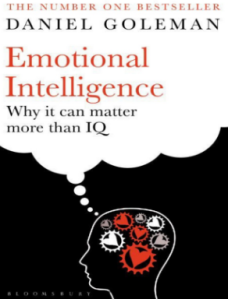Daniel Goleman tells the story of a college student who got a B on a test and the went to see his lecturer and stabbed him in the neck.  He went on to graduate and become a doctor. The issue was that the grade was not high enough for what he needed for medical school so he got mad. There was a court case and the remaining issue for the lecturer was that he never apologised for his actions. The student was obviously academically intelligent but not emotionally intelligent.
He went on to graduate and become a doctor. The issue was that the grade was not high enough for what he needed for medical school so he got mad. There was a court case and the remaining issue for the lecturer was that he never apologised for his actions. The student was obviously academically intelligent but not emotionally intelligent.
Intelligence is more that just academic. I believe to be an effective teaching practitioner in a 21st century kura we need to acknowledge this fact.
Living in Otautahi we know a lot about anxiety and resilience in our young learners. The current year 9 cohort at my kura were about 6-7 years old when the big quakes struck and rolled the city for a time. Anxiety is a big issue with younger learners and it seems that only now are we seeing some of the fall out as these learner transition between schools, citywide. When learners begin secondary school there tends to be a drop academically while they transition. They are more aware of the world around them and are making more connections in person and online. Image is increasingly more important and the haves and have not’s start to notice each other even more. We need to acknowledge that the transition to secondary school is a process and not a one off event.
How can we ensure the transition process is right & safe for learners?
Transition has usually consisted of a entrance test, tour of the school, and peer support from senior students. What do you do if you don’t have senior students? We currently do not have any senior akonga so we are relying on the relationships developed with teachers and those in the community. We are using recognised programmes such as Travellers which support learners in seeing that is a journey and understanding resilience, loss and change is important for personal and social development. We are utilising support services such as the 24/7 Youth team who are extremely proactive in supporting our learners both in and out of the classroom. Developing community connections and making the school accessible for whanau has also been of importance.
Through the programmes and support systems we are developing we are also acknowledging the cognitive skills and abilities that learners have.
This term I have begun to introduce mindfulness practices into the college with teachers and learners having taster mindfulness sessions. Through the Pause, Breathe, Smile course learners will have the opportunity not only to learn about mindfulness practices but to learn how their brains work and why they react the way they do.
For years we have taught content and rammed it into kids brains. Dare I saw it we have taught to the test, come on we’ve all been there. Why haven’t we spent time outside of the science class teaching learners how their brains work so that they can understand better how they learn? Learning about breathing, the vagus nerve and neuroplasticity is exciting for learners and who doesn’t want to know more about themselves.
Looking at how and why people react the way they do through resilience, mentoring or mindfulness programmes enables, or maybe even empowers learners to understand how they learn rather than what to learn. Understanding our emotional intelligence is the start.